| Srl | Item |
| 1 |
ID:
188036
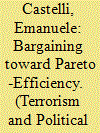

|
|
|
|
|
| Summary/Abstract |
Building on bargaining theory literature, I outline an original rationalist model that takes in consideration the problem of relative gains to explain why bargaining failures may lead to escalation in an open civil war and when negotiations in civil disputes are more likely to lead to Pareto-efficient solutions. I apply the model to the South Tyrol case, a relatively unknown identity-based dispute that emerged in Italy in the aftermath of the Second World War and was defused before it could produce a real escalation in violence. I show that direct and indirect compensations may help to overcome the problem of issue indivisibility, and that third-party intervention in domestic disputes may work as a functional substitute for simultaneity between the agreement and the enforcement phase.
|
|
|
|
|
|
|
|
|
|
|
|
|
|
|
|
| 2 |
ID:
161526
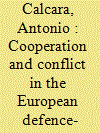

|
|
|
|
|
| Summary/Abstract |
Defence-industrial collaborative activities have gained a central stage in the current European debate, based on the simultaneous presence of two systemic pressures (unipolarity and “defence-industrial globalization”) that are pushing EU member states towards more cooperation in these issues. Nevertheless, the European defence-industrial panorama still continues to be characterized by both cooperation and conflict. Protectionism, oligopolistic market straining and primary resource to domestic suppliers have prevented a more structured defence-industrial cooperation.
|
|
|
|
|
|
|
|
|
|
|
|
|
|
|
|
| 3 |
ID:
090275
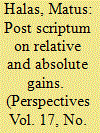

|
|
|
| 4 |
ID:
156320
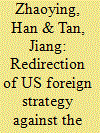

|
|
|
|
|
| Summary/Abstract |
American foreign strategy has had strong continuity siince world war II despite defferences among successive presidents. Donald Trump's 2016 presidential campaign revealed ideas and goals for US strategy and strategy adjustment that differ significantly from those of predecessors. the decline in relative gains and rise in cost for US involvement in globalization are reasons for Trump to redirect US foreign strategy. The relative decrease of both US trade and foreign direct investment in the US, amid security threats and the identity crisis of the American people, has tremendously increased the price tag for US involvement in globalization.
|
|
|
|
|
|
|
|
|
|
|
|
|
|
|
|
| 5 |
ID:
186598
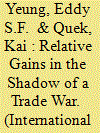

|
|
|
|
|
| Summary/Abstract |
When do people care about relative gains in trade? Much of the international relations scholarship—and much of the political rhetoric on trade—would lead us to expect support for a trade policy that benefits ourselves more than it benefits others. Yet, a large interdisciplinary literature also points to the prevalence and importance of other-regarding preferences, rendering the conventional wisdom contestable. We investigate whether and how relative gains influence trade preferences through an original survey experiment in the midst of the China–US trade war. We find that in a win-win scenario, relative gains shape trade opinion: if both sides are gaining, people want to gain more than their foreign trade partner. However, these considerations are offset in a win-lose scenario where the other side is losing out. Relative-gains considerations causally affect opinion on trade, but not in a “beggar-thy-neighbor” or even a “beggar-thy-rival” situation. These findings contribute to our understanding of the role of relative gains in international relations and provide the first experimental evidence that relative-gains considerations can be offset by other-regarding preferences in international trade.
|
|
|
|
|
|
|
|
|
|
|
|
|
|
|
|
| 6 |
ID:
162933


|
|
|
| 7 |
ID:
184110
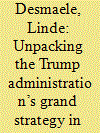

|
|
|
|
|
| Summary/Abstract |
Observers continue to disagree on what, if anything, constituted the overarching logic guiding American foreign policy under the Trump administration, i.e. on how to describe Trump’s grand strategy. Rather than assessing the Trump administration’s statecraft on its own terms, however, most scholars fast forward to prescribing potential alternative approaches. To that end, they often cherry-pick different bits of empirical data to support their argument, without a clear theoretical or methodological justification. This is problematic, for the crucial question of whether Trump’s grand strategy was feasible and consistent with US interests cannot be properly answered without a shared baseline of what it precisely entails. In response, this article analyses factors from a variety of methodological perspectives – preferred modes of action, institutional commitments and discourses. An analysis of these factors in the context of Europe reveals that Trump pursued an onshore balancing strategy that built on three interrelated elements: power maximisation, relative gains and sovereignty. When transposing these elements to the European theatre, it appears that Trump's team pushed for a Europe that was divided, weak and relatively inconsequential as Washington sought to outcompete Beijing in order to retain global primacy.
|
|
|
|
|
|
|
|
|
|
|
|
|
|
|
|